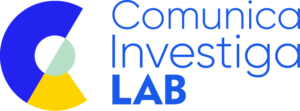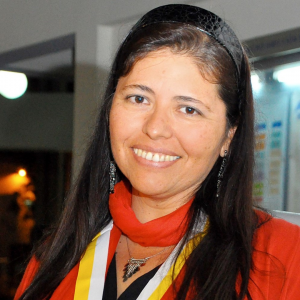Like many students in the last years of high school, I was not quite sure what to study back then. I was doing well in all courses, whether science or literature, and it was probably due to the influence of some people close to me (my math and biology teachers, my father an engineer and my older brother a doctor) that I decided to opt for science and ended up studying biology at Cayetano Heredia University.
Those first university years opened up a universe of multidisciplinary knowledge for me, because in addition to the specialty courses (biochemistry, genetics, botany, ecology, etc.), I took courses in philosophy, archeology, anthropology and literature, with excellent professors who stimulated my interest in relating different fields of knowledge.
I finished high school and did my professional internship in a genetics laboratory performing electrophoresis (a technique that consists of the separation of DNA, RNA or protein molecules by their size, electrical charge and allows the identification of particular genetic characteristics) with blood samples from racehorses to determine the genetic “purity” of the horses. As a research assistant, I had the operational part of repeating the electrophoresis over and over again.
This experience allowed me to learn that laboratory research required patience, perseverance and discipline. At that time it seemed like a very routine job and I wondered if working in a laboratory was for me. I felt more comfortable studying and reflecting creatively, rather than “doing the same thing” over and over again.
Then, I decided to make a radical change in my academic training and studied Philosophy at the PUCP. Another universe of knowledge opened before me. The course that motivated me the most was philosophy of language; understanding that our reality is a symbolic construction broke the scientific positivist paradigm with which I had been formed. My interest in exploring how different types of languages (oral, written, audiovisual) change our way of perceiving the world grew. The realization that human beings are eminently communicational and that we define ourselves through our relationships with others led me to continue expanding my academic training through postgraduate studies in communications.
Communication studies have the advantage of being transdisciplinary. Let us remember that as a field of study, communication emerged after the 1940s, post world wars. The first communication researchers were philosophers (Theodor Adorno), psychologists (Carl Hovland), or sociologists (Paul Lazarsfeld or Erving Goffman). This transdisciplinary origin is still maintained. There is a whole epistemological debate as to whether or not the field of communications should have its own methods and theories. I am one of those who think it should not, because that is precisely where its richness lies.
As I pursued my doctorate in communication and culture at the University of Pittsburgh, I once again had the opportunity to take courses in different disciplines because the curriculum allowed it. I felt almost like in my first university years, this time taking courses in rhetoric, Andean literature, Latin American history, film, media theory, among others.
Something that caught my attention was that the professors who taught in the communications department at the University of Pittsburgh belonged to different disciplines, and what made them part of the communications department was the subject of their research, not their academic background. My thesis advisor, for example, is a historian specializing in epistolary studies in New England during the 18th century. His meticulous archival work also required patience, perseverance and discipline like laboratory work, only this time, the unit of analysis was not the blood samples, but the epistolary corpus, and his object of study was to understand how the communicative process had been in a community through the epistolary genre in a given context and time.
My doctoral thesis, guided by my advisor, was a study of the letters of our writer José María Arguedas, who in addition to being a novelist and poet, was an anthropologist, educator, promoter of Andean music and a great communicator. Through the readings of his letters I discovered that Arguedas was a pioneer researcher in intercultural communication in our country. He had a capacity to relate, connect and move in different social and cultural spheres, at the same time that he expressed his knowledge in different registers (artistic-musical, literary, anthropological, educational). I identified with the approach to knowledge that Arguedas had, that ability to move through different academic disciplines, as this allows us to have flexibility in the theoretical and methodological management that we apply in our studies on any communicative process.
Arguedas confesses in his letters that he was uncomfortable with the rigid academic life and found the methodological tools for anthropological research of his time limiting. Perhaps that is why he felt more comfortable expressing his knowledge through artistic language, because art allows a more integrative mode of expression and that is what Arguedas did best: integrate, connect, relate, through unconventional methods that were little understood in his time. If we think about it, a communications researcher should emulate Arguedas, who always broke disciplinary barriers and strategically used different types of methodologies in order to understand the social and cultural reality of Peru.
I feel comfortable doing research related to communication processes precisely because it allows me to integrate knowledge from different disciplines. With my doctorate under my belt, I had the opportunity to enter the Communications Department of the PUCP to teach the Research Seminar course to undergraduate students in order to do their thesis. This experience, in which I have been involved for ten years now, has shown me that one learns to do research in communications by teaching research in communications. I had always heard that one learns by teaching, and in the case of a course like Research Seminar, I can say with certainty that one learns to do research together with the student who does the research. It is not really a matter of mere accompaniment, but of learning about the topic the student is researching and how he/she is researching it.
Research is a creative process, and although there are certain parameters to follow, each student has his/her own process of discovery of what motivates him/her to research. In the dialogue with the student I verify that creativity in research is fundamental. It is not enough to comply with a methodological structure. And it is precisely this creative part of the student that teaches me the most about research, because there are no established recipes. We constantly have to innovate, adapt, and relate theories and methodologies, with appropriate criteria, to our research objectives.
Now I greatly value what at some point may have seemed to me a vocational mistake, because all my interdisciplinary training has been useful to me. My passage through different university careers has shown me that the basic aspects of all research are the same: the capacity for wonder that allows us to ask questions, creativity, curiosity to explore new knowledge and having a clear objective; then a lot of patience, perseverance and discipline are required. What changes is the object of study, this can be a genetic process or a communicational process, but the attitude of the researcher is always the same: to marvel at what he wants to understand better and to find a method that allows him to answer his questions. However, I repeat that what for me constitutes the epistemological advantage of communications is that it is constantly nourished by other disciplines.
Concluyo esta historia de la ruta que me ha llevado a enseñar/aprender a investigar en comunicaciones, con el agradecimiento de formar parte de esta aventura que es Comunica Investiga Lab, un espacio que era necesario crear en nuestra Universidad, ya que busca estimular y orientar el potencial investigativo que todxs los alumnxs tienen de una manera más horizontal. En Comunica Investiga Lab, todxs juntxs aprendemos-enseñando y enseñamos-aprendiendo a investigar. Todxs somos profesores y alumnos a la vez.





